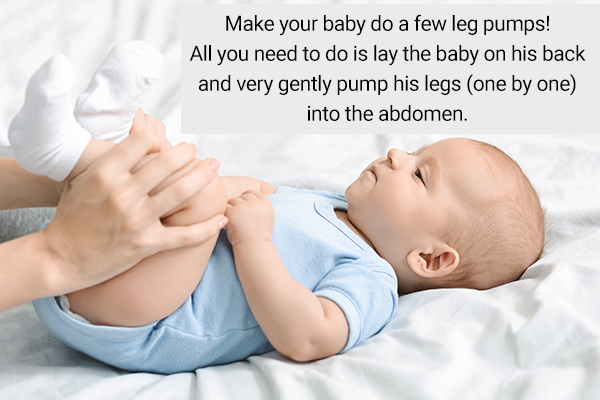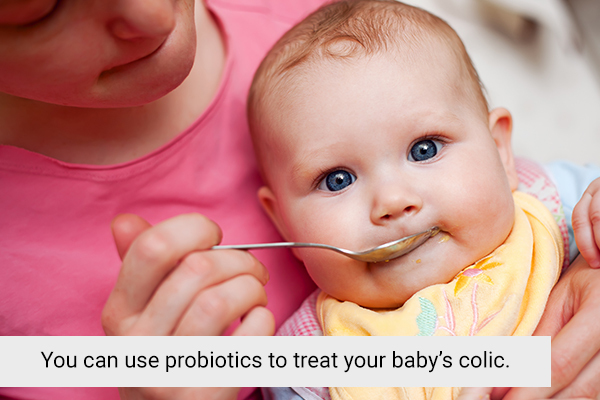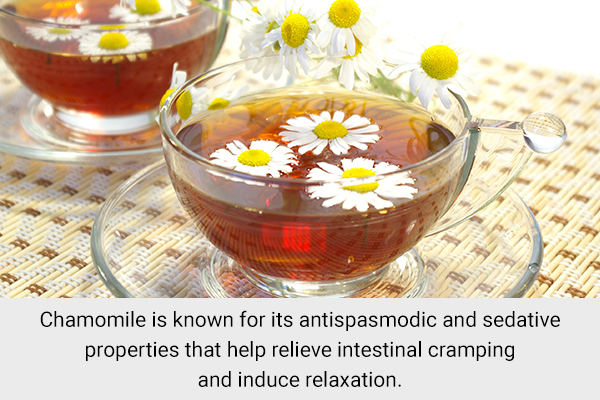In this article:
According to the American Family Physician, infantile colic is a benign process in which an infant has unexplained or intermittent crying for more than three hours per day, over 3 days per week, for more than three weeks.

This problem affects approximately 10% to 40% of infants worldwide. (1)
Colic is commonly seen in healthy babies aged between 2 weeks to 4 months. (2) At times, it can be a problem in older babies too.
Home Remedies to Relieve Colic Discomfort in Babies
Here are the top 10 ways to relieve pain and discomfort of colic in babies.
1. Use a pacifier

A pacifier, also known by several other names including paci, nuk, binky, and dummy, can be of great help in soothing a baby with colic.
Pacifiers are used all over the world to “pacify” babies, help them sleep, keep them relatively quiet, comfort them, and provide an outlet for the instinctive sucking that babies do. (3)
2. Hold the baby correctly
Holding your baby is one of the most effective ways to stop the constant crying. The more hours they spend being comfortably held, (even when they are not fussy) the lesser time they will spend crying in the evening. (4)
If gastroesophageal reflux disease (GERD) is the reason why your baby is colicky, try holding him upright after feeding sessions. Making your baby lie on his/her back or making him/her recline in a car seat right after feeding can worsen the symptoms, causing the baby to be fussy.
Also, do not forget to burp the baby after every feeding session. Not burping the baby or incorrect positioning after feeding is one of the causes of colic in babies. Burping helps release gas and prevent the formation of air pockets in the stomach, which can cause a lot of discomforts.
3. Swaddling

Before birth, babies spend months crammed snugly in the womb. They are used to the secure pressure they experience in there. The openness, freedom of movement, and reflexes of the limbs post-birth can be a bit strange for them initially. Thus, they may take some time to adjust.
Swaddling is the best way to keep your baby snug and comfortable. Master your swaddling technique using a muslin blanket. You may also go for baby swaddling wraps available in the market. (4)
4. Give your baby an oil massage
Regular oil massages can also do wonders for a baby suffering from colic pain. Massage aids in keeping the infant warm, ensuring proper digestion, and preventing gas. Moreover, it helps the baby sleep after every feeding.
A 2017 study published in the Iranian Journal of Nursing and Midwifery Research found that massage treatment has a clinically relevant effect on colic condition. (5)
For better results, go with Aromatherapy Abdominal Massage using lavender oil.
A 2012 study published in the International Journal of Nursing Practice reports that aromatherapy massage using lavender oil was found to be effective in reducing the symptoms of colic. The effect of the massage was measured in terms of changes in the length of time the infants cried per week. (6)
How to do:
- Take some warm olive oil and add a few drops of lavender essential oil to it.
- Use this oil mixture to gently massage the baby’s tummy in a clockwise circular motion.
- Also massage the baby’s rib cage, pelvis, hands, and feet.
- Do this several times a day.
5. Get rid of trapped gas

Trapped gas can be a reason babies may get colicky. (7) A few light exercises can help in relieving the baby of the discomfort caused by trapped gas.
How to do:
- Make your baby do a few leg pumps! All you need to do is lay the baby on his back and very gently pump his legs (one by one) into the abdomen. You can make a bicycle motion with the baby’s legs or simply pump both the legs into his torso at the same time. However, make sure you do this very gently and carefully.
- Alternatively, you can simply make the baby lie down (on his belly) across your lap. Make sure the majority of the baby’s weight is resting on your knee. This trick can also be effective in relieving trapped gas.
- If everything else fails, there is another method you can try to soothe a gassy baby. Hold the baby against your chest (face out). Your arms should be wrapped around his belly. Now apply slight pressure, let the baby hang on your arm, and bounce (slightly). This will help in getting out the burps.
6. Use sound
You can also use sounds or some kind of soothing noise to calm your colicky baby. It has been found that babies respond well to the gentle hum of a machine. For example, you can use the sound of a cloth dryer, fan, vacuum, or white-noise machine.
A 2018 study published in the Journal of Clinical Nursing found that compared with swinging, playing white noise significantly decreased the daily crying durations and increased the sleeping durations of colicky babies. (8)
How to use:
To calm your baby, you can also play classical music or a “heartbeat soundtrack” next to the crib and see how your child responds to it.
7. Probiotics

You can also use probiotics to treat your baby’s colic. The “good bacteria” introduced in your baby’s system through probiotic supplements helps in improving the functioning of the intestines and aid in the digestion of food. This, in turn, provides relief to your baby.
A 2017 study published in the journal Pediatrics found that L reuteri DSM 17938 is effective and recommended for breastfed infants with colic. Its role in formula-fed infants with colic needs further research. (9)
Talk to your health care provider about using probiotics for infants.
8. Fennel seeds
This wonderful herb works well for colicky babies. It can relieve gas and alleviate general stomach-related discomforts. Both babies and breastfeeding mothers can take benefit from fennel seeds.
A 2003 study published in the Alternative Therapies in Health and Medicine suggests that fennel seed oil emulsion is superior to placebo in decreasing the intensity of infantile colic. (10)
How to use:
- Add 1 teaspoon of crushed fennel seeds to 1 cup of hot water.
- Cover and steep for 10 to 15 minutes, and then strain it.
- A breastfeeding mother can drink this tea, 2 or 3 times a day. Small babies can be given a ½ to 1 teaspoon of this herbal tea 3 times a day, under the direction of a doctor.
- Follow this treatment on a daily basis.
9. Chamomile tea

Chamomile is known for its antispasmodic and sedative properties that help relieve intestinal cramping and induce relaxation. This makes chamomile tea a popular remedy for colic in babies.
According to a 2007 study review by The American Academy of Pediatrics, chamomile tea can help in eliminating colic in infants. It was found that infants who were offered chamomile tea of up to 150 milliliters no more than three times a day, experienced relief from colic discomforts. (11)
How to use:
- Put ½ teaspoon of dried chamomile flowers in a cup and pour boiling water over it.
- Cover and steep for 10 minutes.
- Strain and allow it to cool to room temperature.
- Feed this tea in small doses (1 teaspoon) to your baby throughout the day, under the direction of a doctor.
A cup of chamomile tea 2 or 3 times a day may also prove to be beneficial for breastfeeding mothers.
Note: Do not feed more than 2 to 4 ounces of chamomile tea to infants. Avoid strong chamomile tea.
10. Peppermint
Due to its calming and antispasmodic properties, peppermint helps reduce flatulence and other digestive conditions in infants.
A 2012 study published in Evidence-Based Complementary and Alternative Medicine suggests that peppermint may be used to help control infantile colic. (12)
How to use:
- Take 1 tablespoon of baby massage oil and add 2 drops of peppermint oil to it. Massage your baby’s abdominal area with this oil mixture using gentle circular motions. Do this at least 2 times daily.
- Alternatively, add 1 teaspoon of dried peppermint leaves to 1 cup of boiling water. Allow it to steep for 10 minutes, and then strain it. Breastfeeding mothers can drink this tea 2 or 3 times a day.
Causes of Colic
The exact cause behind this condition is unknown, but a potential reason is that the air trapped in the abdominal cavity leads to pain and discomfort in infants.
According to a 2000 study published in the British Journal of Community Nursing, Transient Lactose Intolerance, as a result of inadequate production of the enzyme lactase, is one possible reason of colic in babies. (3)
Another 2012 study published in the Archives of Pediatrics & Adolescent Medicine found that H. Pylori infection is associated with infantile colic and may be a causative factor. (4)
Infantile colic is also associated with Carbohydrate Malabsorption from fruit juices containing sorbitol and a high fructose-to-glucose ratio. This is pointed out in a 2002 study published in the journal Pediatrics. (5)
Also, babies born to mothers who smoked during pregnancy or after delivery, have a greater risk of developing colic.
A 2000 study published in the Archives of Diseases in Childhood found that the prevalence of colic was twofold higher among infants of smoking mothers, but less among breastfed infants. Maternal smoking as a potential risk factor for infantile crying needs further study. (6)
Symptoms of Colic

Symptoms of colic include:
- Pain
- Crying
- Moaning
- Finicky behavior
- Cramping
In severe cases, babies can also show the following symptoms:
- Frequent vomiting
- Change in stools
- Unstable body temperature
- Poor weight gain
- Fatigue
Colic can be distressing for the parents as well. Parents of colicky babies can suffer from relationship stress, breastfeeding problems, and even postpartum depression.
A 2014 study published in the Turkish Journal of Pediatrics reports that infantile colic was associated with higher maternal depression and lower quality of life scores. As such, mothers who have babies with infantile colic should be closely monitored. (7)
When to Call the Doctor
It is recommended that you seek medical attention if:
- The baby cries a lot.
- There is a sudden change in the behavior or the crying pattern of your baby.
- The baby is three months old and is still colicky.
- The baby is experiencing symptoms such as fever, bloody stools, diarrhea, forceful vomiting, and stomach issues.
Final Word
Colic in babies is very common and rarely a cause of concern. But it is best to seek medical advice in order to rule out the possibility of a more serious underlying issue.
In case you are feeling overwhelmed or unable to cope with the situation, seek help for yourself immediately.
Being a parent, you need to handle the situation with care, and just remember that the colic will disappear in a matter of weeks or months. In the meantime, you can try some simple home remedies to help alleviate your child’s discomfort and fussiness.
- Was this article helpful?
- YES, THANKS!NOT REALLY



